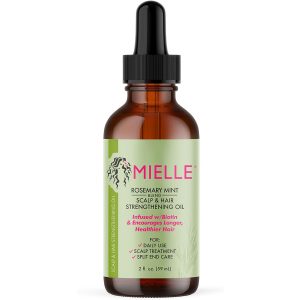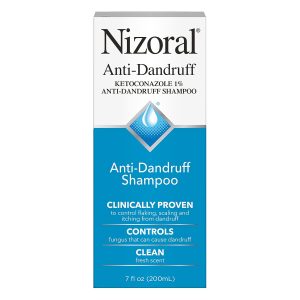TL;DR – there are a couple of small clinical studies evaluating the effects of rosemary for hair growth, one of them among men only. The results indicate that rosemary oil may be effective in stimulating hair growth, possibly as well as minoxidil (a commonly used hair growth medication) and with better patient compliance and satisfaction.
Rosemary Shampoo for Hair Loss & Hair Growth
People have been using rosemary oil for a long time to help with hair growth and keep their scalps healthy. Ancient cultures loved it for its great smell and healing properties, and it’s been passed down through generations as a go-to for natural hair care. Whether it’s through scalp massages or hair treatments, rosemary oil has always been believed to boost hair follicles and improve circulation. Even now, many people still swear by its ability to give them healthier, thicker hair.
I first heard about rosemary oil for hair loss and hair growth via a Tik Tok video and was initially skeptical. But the algorithm was persistent and kept showing me all the success stories. I became curious and thus began my deep dive into the science behind rosemary oil.
How does Rosemary Work for Hair Growth?
The active ingredient in rosemary is carnosic acid, which is purported to help promote nerve growth, improve circulation and have anti-inflammatory and anti-microbial properties. In layman’s term, these properties can translate to nurturing of the scalp, relaxing scalp vessel and boosting blood flow and circulation for more nutrients (prevents hair loss), protecting hair from stress and preventing hair loss caused by inflammation. Additionally it has nourishing and conditioning properties leading to silky and soft hair.
Scientific evidence for Rosemary and Hair Growth
- A 2015 study from Iran studied 100 men with alogenic alopecia (male/female patterned baldness). They measured their hair at baseline and split them into 2 groups. One group received rosemary oil (n=50) and the other received minoxidil 2% (n=50).
- Results: Scientists measured the difference in hair count in both groups at 3 months and 6 months. At 3 months, there was no difference in hair count compared to baseline in either group. At 6 months, both the rosemary oil group and the minoxidil group had significantly more hair count compared to baseline. Interestingly, patient satisfaction was higher in the rosemary group. Hair loss was also marginally lower in the rosemary group vs. minoxidil. compliance was better in the rosemary group, which also experienced less scalp itching vs. minoxidil.
- Method:Patients applied 1ml of either rosemary oil or 1 ml of minoxidil and massaged it onto their scalp twice a day.
- This 1998 study investigated the effectiveness of aromatherapy in treating alopecia areata (an autoimmune condition characterized by sudden, patchy hair loss on the scalp, face, or other parts of the body) involving 86 patients over 7 months. One group massaged essential oils (thyme, rosemary, lavender, cedarwood) mixed with carrier oils into their scalp daily, while the placebo group used only carrier oils. Results showed that 44% of the active group experienced improvement in their alopecia compared to 15% of the control group. The study concluded that aromatherapy with these essential oils is a safe and effective treatment for alopecia areata, showing greater benefits compared to carrier oils alone.
- One lab study from 2012 studied rosemary leaf extract and showed that it activated hair growth in mice through inhibition of testosterone, which is a known mechanism to treat male pattern baldness.
In summary, I could only find 2 studies in humans in recent years and one of them only evaluated rosemary in men. The two studies did look at 2 different types of hair loss (alopecia areata and alogenic alopecia) and the results seem promising. Notably, they used rosemary oil, not shampoo, and the products were massaged into the scalp daily and several times each week. This leads me to assume that for maximum efficacy, you need to be using the concentrated oil and that adding a few drops of rosemary shampoo may not be sufficient to see the effects of rosemary for hair growth.
Considerations When Using Rosemary for Hair Growth & Hair Loss

After reading the above, if you decide you want to try using rosemary oil for hair growth, I’ve listed some considerations to ensure safety and optimal effectiveness.
- Quality of Rosemary Oil
Purity: Use 100% pure, therapeutic-grade rosemary essential oil. Avoid products with synthetic additives or diluted forms.Choose oils from reputable brands that provide information about the source and extraction process.
- Dilution
Carrier Oils: Always dilute rosemary oil with a carrier oil (such as coconut, jojoba, or grapeseed oil) to prevent skin irritation. A common ratio is a few drops of rosemary oil per tablespoon of carrier oil.
- Application Method
- Scalp Massage: Massage the diluted oil into the scalp for at least 3-5 minutes to increase blood circulation and promote absorption. Leave it on for at least 30 minutes or overnight before washing it out.
- Add to Shampoo: Add a few drops to your regular shampoo or conditioner for a more convenient application. This method is likely less effective as it further dilutes the amount of rosemary you’re applying, but it’s worth a try if you’re unable to tolerate direct application of the oil
- Rosemary water: disclaimer – there is no published evidence that rosemary water (vs. the oil) is effective for hair growth or preventing hair loss. However, if you’re unable to tolerate the oil consider rosemary water. It’s also a nice alternative for days when you don’t want to use the oil. I have an easy recipe here.
- Frequency of Use
Consistency: Regular application is key. According to the trials, the ideal frequency is at least 1-2 times a day. If that’s not attainable, try to apply at least 1-2 times a week for best results.
- Patch Test
Allergy Check: Perform a patch test before full application to ensure you don’t have an allergic reaction. Apply a small amount of diluted oil on your inner forearm and wait 24 hours to check for any adverse reaction.
- Potential Side Effects
- Skin Irritation: Undiluted rosemary oil can cause irritation or allergic reactions. Dilute properly and discontinue use if irritation occurs.
- Avoid eye contact and rinse immediately if product gets into eyes
- Rosemary oil can also have a strong scent, which may not be tolerable to everyone
- Rosemary oil can make hair very oily – I recommend doing this on days you’re washing your hair if your hair is very oil prone. Alternatively, you can massage this under a layer of clean hair so that the oil doesn’t show at the top. One other method would be to do a combination of both – use the oil on days when you’re planning to wash your hair and on alternate days, use a rosemary water spray.
- Pregnancy and Health Conditions: Consult a healthcare provider before use if you are pregnant, breastfeeding, or have underlying health conditions.
- Combining with Other Treatments
- Complementary Use: Rosemary oil can be used alongside other hair growth treatments, but consult a healthcare provider to avoid potential interactions.
- Medication Interactions: Be aware of potential interactions with medications, particularly those affecting the skin or scalp.
- Storage
Proper Storage: Store rosemary oil in a cool, dark place to preserve its potency. Ensure the bottle is tightly sealed to prevent oxidation.
- Expectations
Realistic Goals: Understand that natural remedies like rosemary oil may take time to show results and may not work for everyone. Patience and consistent use are important.
What Should You Expect?
- Based on the 2015 study, you need to use this consistently for at least 6 months before seeing results
- There is no evidence that rosemary water or rosemary oil dilution (into shampoo or conditioner) works as well as directly applying rosemary oil
Personal Journey
On a personal level, I have been using rosemary oil, along with other hair products to help promote hair growth. I initially started out using only the rosemary oil for a good 4-6 months and while I did not see significant hair growth, what I noticed right away, within 2-3 weeks, was the hair shedding stopped almost completely. However, if I didn’t use it for an extended amount of time (e.g. >1-2 weeks), I would see some hair shedding again. One of the key things I’ve learned with hair loss is that you need to address it right away. If you wait too long, you may lose your opportunity to stimulate the growth back. Additionally, there could be multiple reasons for your hair loss, so it doesn’t hurt to try multiple approach treatments. I continue to use the rosemary oil to help reduce hair shedding but also recommend using ketoconazole shampoo to help further reduce hair loss, strengthen hair quality and help with hair growth. I’ll touch on the data and science behind that in another post.


As an Amazon affiliate, I may earn compensation from qualifying purchases




